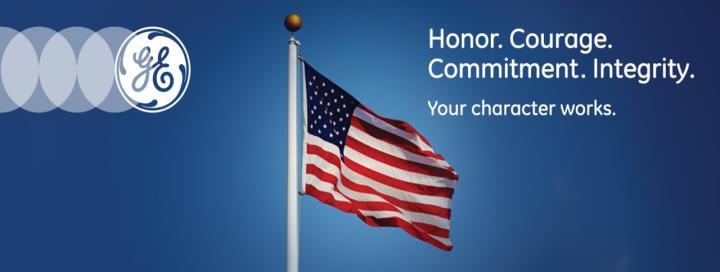Veterans from GE's veteran leadership development program share their empowering insights!
We all hear of veterans struggling in many ways to successfully transition from the military to an honorable and fulfilling life in the civilian sector that they have earned through their sacrifice of serving our nation. These stories dominate the veterans news and make newly transitioning veterans wonder if they will ever find a future filled with success and honor that they deserve. I’m here to tell you the answer is a resounding, "Yes!"
"Hey, you've been making changes. You've been put in tough situations the whole time that you've been in the military. This is one more step in that process."
– Sarah Bushong
I recently had the honor of interviewing Veterans who transitioned from the military through the General Electric (GE) Junior Officer Leadership program (JOLP). According to GE’s JOLP website the mission of the program “is to transition high performing military officers into successful GE Careers.”

During the interviews I asked these inspirational veterans some questions that will provide key insights into what they believe contributed to their success. They want every veteran to believe that they too can transition into a fulfilling career, regardless of where they are now. While this article references one of the most phenomenal veteran officer job programs available there are others that apply those that were not officers.
Each veteran pointed out that quality of their military experience had much more value to the civilian sector than they realized. As a veteran never underestimate the value you bring to the world, there is not training or any other background as robust.
“I think, outside of influencing and effective communication -- having a high aptitude, being the good leader, the good follower, being humble allows you to learn new products or another business function quickly.”
– Adam Franco
The following are some common strengths, skills, characteristics and abilities that these veterans believe were gained during their time in the military and will serve them well in the civilian sector.
- Perseverance: Accomplish the task at hand no matter what, no excuses.
- Accountability /Dependability: Consistently meet the mission requirements.
- Thirst for knowledge: Quick and adept learner.
- Commitment to Excellence: Evolving aptitude.
- Caring leader: Knowing when to lead and when to follow.
- Integrity: Commitment to be a team player including the importance of being humble.
- Ability to Influence: Understanding what others need and providing service/support that benefits both sides.
- Understanding the use of Emotional Intelligence: Being able to effectively manage your emotions and interpersonal relationships.
- Effective Communication: Build and sustain rapport with all personality styles and rank.
- Displaying Adaptability: Be open and show respect to other people's ideas and capabilities.
- Handle stressful situations: Knowing that you have endured and succeeded in similar high stress situations.
- Embrace life-long learning: Quickly grasping new technical and leadership knowledge.
- Being an immediate contributor – Proactively positioning yourself to be ready when needed.
In conversation with these Veterans the following is the framework that they had in common to make an amazing transition from the military to their current prosperous and fulfilling civilian careers.
“I think when you get out you have to approach getting out almost like a deployment.”
– Adam Franco
- Research - There is so much information available it’s like drinking from a fire hose, start well in advance of your point of transition.
- Preparation - Write your resume to highlight more of your technical experience vice your leadership experience and ensure your experience is reflected in measurable metrics in your resume.
- Planning - Determine the industry you are most interested in pursuing and look for Veteran friendly companies, specifically those with veteran based job programs.
- Training – Decide on and pursue the degree or certifications you will need for your future.
- Networking - Look for networks or groups of other transitioning Veterans for support and if graduated from a service academy look for groups that are from those organizations
- Job Programs – Look for veteran based job programs that share the common military lingo and provide support by other veterans in the program.
“I think one of the worst things that veterans can do is get frustrated with something and get out as if they're spiting the military.”
– Sarah Bushong
The information collected from these interviews is amazingly insightful and useful for those in transition. There are some very key points that will need to be adjusted to each Veteran's situation so that they can be just as a successful. One of the most important things I heard was, you are not alone in your transition. The interviewees encourage Veterans to seek out other Veterans that are in transition and/or have transitioned successfully. They found having fellow Veterans to lean on and ask questions to be the single biggest key to success, even with the use of job programs, such as GE’s JOLP veterans program. GE recently reached its goal of hiring 5,000 veterans in 5 years, and the company has since committed to ensuring 10 percent of all new hires are vets. For more information on the GE JOLP program please go to their website.
Contributing article by Dwayne Paro

Dwayne is a Founder/Coach/Speaker/Writer with Landmark Life Coaching. Their mission is to honorably and respectfully serve courageous groundbreakers and transitioning veterans to persevere in defining and executing their future by providing an atmosphere of comraderie and trust that honors their dedication and commitment. Reach out to Dwayne via e-mail or LinkedIn.


